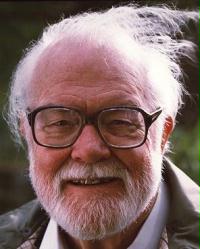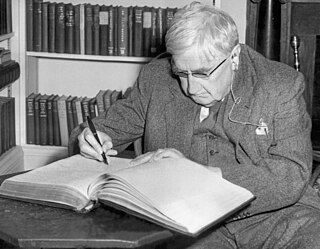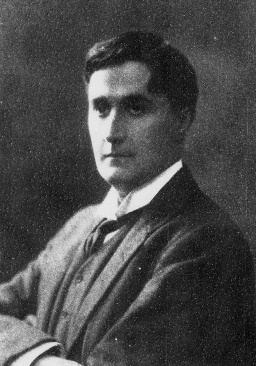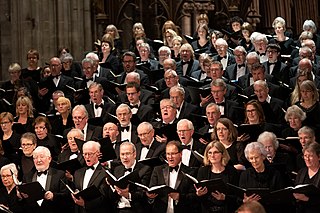
Ralph Vaughan Williams was an English composer. His works include operas, ballets, chamber music, secular and religious vocal pieces and orchestral compositions including nine symphonies, written over sixty years. Strongly influenced by Tudor music and English folk-song, his output marked a decisive break in British music from its German-dominated style of the 19th century.

Fantasia on a Theme by Thomas Tallis, also known as the Tallis Fantasia, is a one-movement work for string orchestra by Ralph Vaughan Williams. The theme is by the 16th-century English composer Thomas Tallis. The Fantasia was first performed at Gloucester Cathedral as part of the 1910 Three Choirs Festival, and has entered the orchestral repertoire, with frequent concert performances and recordings by conductors and orchestras of various countries.

Sir Charles Barnard Groves CBE was an English conductor. He was known for the breadth of his repertoire and for encouraging contemporary composers and young conductors.

A Sea Symphony is an hour-long work for soprano, baritone, chorus and large orchestra written by Ralph Vaughan Williams between 1903 and 1909. The first and longest of his nine symphonies, it was first performed at the Leeds Festival in 1910 with the composer conducting, and its maturity belies the relatively young age – 30 – when he began sketching it. Moreover it is one of the first symphonies in which a chorus is used throughout as an integral part of the texture and it helped set the stage for a new era of symphonic and choral music in Britain during the first half of the 20th century. It was never numbered.
Hugh the Drover is an opera in two acts by Ralph Vaughan Williams to an original English libretto by Harold Child. The work has set numbers with recitatives. It has been described as a modern example of a ballad opera. Contemporary comment noted the use of humour and the role of the chorus in the work, in the context of developing English opera.
The Pilgrim's Progress is an opera by Ralph Vaughan Williams, based on John Bunyan's 1678 allegory The Pilgrim's Progress. The composer himself described the work as a 'Morality' rather than an opera. Nonetheless, he intended the work to be performed on stage, rather than in a church or cathedral. Vaughan Williams himself prepared the libretto, with interpolations from the Bible and also text from his second wife, Ursula Wood. His changes to the story included altering the name of the central character from 'Christian' to 'Pilgrim', so as to universalise the spiritual message.

Crown Imperial is an orchestral march by William Walton, commissioned for the coronation of King George VI in Westminster Abbey in 1937. It is in the Pomp and Circumstance tradition, with a brisk opening contrasting with a broad middle section, leading to a resounding conclusion. The work has been heard at subsequent state occasions in the Abbey: the coronation of Queen Elizabeth II in 1953, the wedding of Prince William in 2011 and the coronation of King Charles III in 2023. It has been recorded in its original orchestral form and in arrangements for organ, military band and brass band.

Ralph Vaughan Williams's Symphony No. 8 in D minor was composed between 1953 and 1955. Sir John Barbirolli, its dedicatee, conducted the Hallé Orchestra in the premiere at the Kings Hall in Manchester, on 2 May 1956. It is the shortest of the composer's nine symphonies, and is mostly buoyant and optimistic in tone.
The Concerto in F Minor for Bass Tuba and Orchestra by British composer Ralph Vaughan Williams was written in 1954 for Philip Catelinet, principal tubist of the London Symphony Orchestra (LSO), who together gave the premiere on 13 June 1954 with Sir John Barbirolli conducting. The same musicians made the work’s first recording that same year. This concerto was the first concerto written for solo tuba.

Dona nobis pacem is a cantata written by Ralph Vaughan Williams in 1936 and first performed on 2 October of that year. The work was commissioned to mark the centenary of the Huddersfield Choral Society. Vaughan Williams produced his plea for peace by referring to recent wars during the growing fears of a new one. His texts were taken from the Mass, three poems by Walt Whitman, a political speech, and sections of the Bible. A.V. Butcher has analysed Vaughan Williams' use of the Whitman poems in this composition.
Morning Heroes is a choral symphony by the English composer Arthur Bliss. The work received its first performance at the Norwich Festival on 22 October 1930, with Basil Maine as the speaker/orator. Written in the aftermath of World War I, in which Bliss had performed military service, Bliss inscribed the dedication as follows:
"To the Memory of my brother Francis Kennard Bliss and all other Comrades killed in battle"

A Survivor from Warsaw, Op. 46, is a work for narrator, chorus and orchestra by the Los Angeles–based Austrian composer Arnold Schoenberg, written in tribute to Holocaust victims. The main narration is written in Sprechgesang style, between speaking and singing; "never should there be a pitch" to its solo vocal line, wrote the composer.
The Symphony No. 1 in B♭ minor is one of two symphonies by the English composer William Walton. The composer had difficulty in completing the work, and its first public performance was given without the finale, in 1934. The complete four-movement work was premiered the following year.

The Five Mystical Songs are a musical composition by English composer Ralph Vaughan Williams (1872–1958), written between 1906 and 1911. The work sets four poems by seventeenth-century Welsh poet and Anglican priest George Herbert (1593–1633), from his 1633 collection The Temple: Sacred Poems. While Herbert was a priest, Vaughan Williams himself was an atheist at the time, though this did not prevent his setting of verse of an overtly religious inspiration. The work received its first performance on 14 September 1911, at the Three Choirs Festival in Worcester, with Vaughan Williams conducting.

Sāvitri is a chamber opera in one act with music composed by Gustav Holst, his Opus 25, to his own libretto. The story is based on the episode of Savitri and Satyavan from the Mahābhārata, which was also included in Specimens of Old Indian Poetry and Idylls from the Sanskrit. The opera features three solo singers, a wordless female chorus, and a chamber orchestra of 12 musicians. Holst had made at least six earlier attempts at composing opera before arriving at Sāvitri.
Riders to the Sea is a short one-act opera by Ralph Vaughan Williams, based on the play of the same name by John Millington Synge. The composer completed the score in 1927, but it was not premiered until 1 December 1937, at the Royal College of Music, London. The opera remained largely the province of students and amateurs until it entered the repertoire of Sadler's Wells in 1953.
Hymnus Paradisi is a choral work by Herbert Howells for soprano and tenor soloists, mixed chorus, and orchestra. The work was inspired in part by the death from polio of his son Michael in 1935. Howells wrote the work from 1936 to 1938, drawing on material from the then-unpublished Requiem of 1932, but then retained the music privately, without public performance. Howells maintained later in life that Ralph Vaughan Williams convinced him to allow the work to be performed publicly at the Three Choirs Festival. However, his former pupil and biographer Paul Spicer contends that Howells first showed the music to Herbert Sumsion, organist of Gloucester Cathedral, who in turn showed it to Gerald Finzi, and that only after these two expressed their enthusiasm did Howells show the music to Vaughan Williams. The title 'Hymnus Paradisi' was suggested by Sumsion. The work received its successful premiere at the Festival in 1950. The score was published in 1951.

A choral symphony is a musical composition for orchestra, choir, and sometimes solo vocalists that, in its internal workings and overall musical architecture, adheres broadly to symphonic musical form. The term "choral symphony" in this context was coined by Hector Berlioz when he described his Roméo et Juliette as such in his five-paragraph introduction to that work. The direct antecedent for the choral symphony is Ludwig van Beethoven's Ninth Symphony. Beethoven's Ninth incorporates part of the Ode an die Freude, a poem by Friedrich Schiller, with text sung by soloists and chorus in the last movement. It is the first example of a major composer's use of the human voice on the same level as instruments in a symphony.
The London Philharmonic Choir (LPC) is one of the leading independent British choirs in the United Kingdom based in London. The patron is Princess Alexandra, The Hon Lady Ogilvy and Sir Mark Elder is president. The choir, comprising more than 200 members, holds charitable status and is governed by a committee of 6 elected directors. As a charity, its aims are to promote, improve, develop and maintain education in the appreciation of the art and science of music by the presentation of public concerts.

Worcester Festival Choral Society (WFCS) is an independent, SATB (soprano, alto, tenor, bass) choir of around 150 amateur singers that presents classical choral concerts at Worcester Cathedral, Worcester. The conductor is Samuel Hudson (Worcester Cathedral’s Director of Music) and the accompanist is Nicholas Freestone (Worcester Cathedral’s Assistant Director of Music). The Chairman is Susan White. The President is The Lord Bishop of Worcester and Senior Vice President is The Dean of Worcester.












